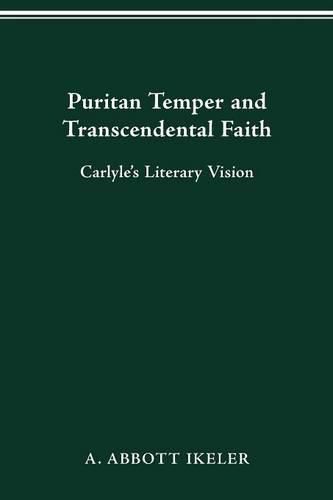Readings Newsletter
Become a Readings Member to make your shopping experience even easier.
Sign in or sign up for free!
You’re not far away from qualifying for FREE standard shipping within Australia
You’ve qualified for FREE standard shipping within Australia
The cart is loading…






This title is printed to order. This book may have been self-published. If so, we cannot guarantee the quality of the content. In the main most books will have gone through the editing process however some may not. We therefore suggest that you be aware of this before ordering this book. If in doubt check either the author or publisher’s details as we are unable to accept any returns unless they are faulty. Please contact us if you have any questions.
Over the years, students of Victorian literature have remarked in the writings of Thomas Carlyle a certain bewildering ambivalence in his attitude toward the value of literature in life, and, by extension, toward aesthetic experience in general. Readers who have been drawn to Carlyle by Sartor Resartus and the early essays have found no more effective antidote to their enthusiasm for his work than the Latter-Day Pamphlets. Various explanations of this contrariety have been proposed. Professor Ikeler, who begins by weighing each, ends by discarding all. Carlyle’s attitudes, he argues, were profoundly affected by-indeed inseparable from-his religious thought. If Carlyle’s veneration of literatures and its creators sprang from his transcendental faith on the one hand, his distrust and outright rejection of literary art were the result of his being the son of strict Scottish Calvinists on the other. For the first time in the critical literature, Mr. Ikeler gives serious consideration and systematic attention to this Calvinist background, which has been so much referred to and so little explored. He finds that those antithetical forces that characterize Carlyle’s moral and religious thought remain unreconciled in his aesthetic. Through an exhaustive analysis of the expressed opinions on the art of Calvin, Knox, and the chief German Romantics, Professor Ikeler demonstrates conclusively that, when viewed in the light of Carlyle’s overall intellectual development, the apparent incongruities in his attitude toward art are but fugitive fragments of underlying and wholly coherent bodies of thought. A. Abbott Ikeler is an assistant professor of English at Bowdoin College.
$9.00 standard shipping within Australia
FREE standard shipping within Australia for orders over $100.00
Express & International shipping calculated at checkout
This title is printed to order. This book may have been self-published. If so, we cannot guarantee the quality of the content. In the main most books will have gone through the editing process however some may not. We therefore suggest that you be aware of this before ordering this book. If in doubt check either the author or publisher’s details as we are unable to accept any returns unless they are faulty. Please contact us if you have any questions.
Over the years, students of Victorian literature have remarked in the writings of Thomas Carlyle a certain bewildering ambivalence in his attitude toward the value of literature in life, and, by extension, toward aesthetic experience in general. Readers who have been drawn to Carlyle by Sartor Resartus and the early essays have found no more effective antidote to their enthusiasm for his work than the Latter-Day Pamphlets. Various explanations of this contrariety have been proposed. Professor Ikeler, who begins by weighing each, ends by discarding all. Carlyle’s attitudes, he argues, were profoundly affected by-indeed inseparable from-his religious thought. If Carlyle’s veneration of literatures and its creators sprang from his transcendental faith on the one hand, his distrust and outright rejection of literary art were the result of his being the son of strict Scottish Calvinists on the other. For the first time in the critical literature, Mr. Ikeler gives serious consideration and systematic attention to this Calvinist background, which has been so much referred to and so little explored. He finds that those antithetical forces that characterize Carlyle’s moral and religious thought remain unreconciled in his aesthetic. Through an exhaustive analysis of the expressed opinions on the art of Calvin, Knox, and the chief German Romantics, Professor Ikeler demonstrates conclusively that, when viewed in the light of Carlyle’s overall intellectual development, the apparent incongruities in his attitude toward art are but fugitive fragments of underlying and wholly coherent bodies of thought. A. Abbott Ikeler is an assistant professor of English at Bowdoin College.